Inspector Joseph French is a fictional British police detective created by Irish author Freeman Wills Crofts. French was a prominent detective from the Golden Age of Detective Fiction, appearing in twenty nine novels and a number of short stories between 1924 and 1957. The character was introduced in the 1924 novel Inspector French's Greatest Case, where he investigates a deadly diamond robbery in Hatton Garden. The series relied largely on puzzle mysteries.
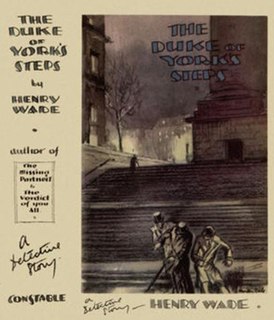
The Duke of York's Steps is a 1929 mystery detective novel by the British writer Henry Wade. It was the first in a series of seven novels featuring the character of Chief Inspector Poole, published during the Golden Age of Detective Fiction. The title refers to the steps that connect the Duke of York Column to The Mall in Central London. It is notable for its portrayal of a German Jewish character, a banker who seeks revenge for his mistreatment by murdering a fellow banker. It was well-received by critics and sold well. In The Observer the reviewer Gerald Gould wrote "It would be difficult to overpraise it".

No Friendly Drop is a 1931 mystery detective novel by the British writer Henry Wade. It was the second in a series of seven novels featuring the character of Inspector Poole, published during the Golden Age of Detective Fiction. It was released in the United States the following year by Brewer and Warren where it received positive reviews in the New York Herald Tribune and the New York Evening Post, with the latter describing it as "A superior detective story, depending more upon intrinsic interest in a logical plot than upon excitement and goriness for its hold on the reader".

The Hanging Captain is a 1932 mystery detective novel by the British writer Henry Wade. Wade was a writer of the Golden Age of Detective Fiction, best known for his series featuring Chief Inspector Poole. This was one of a number of stand-alone novels he wrote.
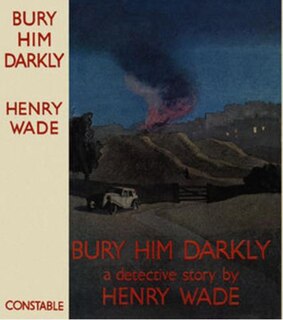
Bury Him Darkly is a 1936 mystery detective novel by the British writer Henry Wade. It was the fourth in a series of seven novels featuring the character of Inspector Poole. Along with the following Poole novel, Lonely Magdalen, it marked a shift towards more realistic police procedurals that has been described as pioneering. Superintendent Fraser, who appeared in Wade's fist novel The Verdict of You All, also appears as one of the characters.
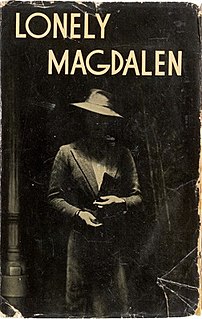
Lonely Magdalen is a 1940 mystery detective novel by the British writer Henry Wade. It was the fifth in a series of seven novels featuring the character of Inspector Poole, published during the Golden Age of Detective Fiction. The book focuses more closely on police procedural than the traditional puzzle format. There was a thirteen year gap between this and the next entry in the series Too Soon to Die.

The Verdict of You All is a 1926 mystery detective novel by the British writer Henry Wade, his debut novel. Both this and his following novel The Missing Partners revolve around potential miscarriages of justice. It was published in the United States by Payson and Clarke in 1927. A success it launched his career as one of the prominent writers during the Golden Age of Detective Fiction. The title refers to the traditional question asked in court by a judge of the jury to establish whether they have reached a unanimous verdict.

The Missing Partners is a 1928 mystery detective novel by the British writer Henry Wade. It was his second novel following his successful debut The Verdict of You All in 1926.
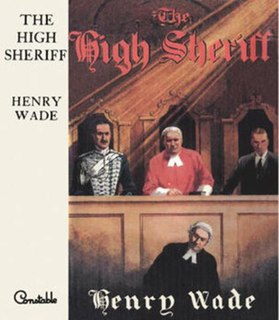
The High Sheriff is a 1937 mystery detective novel by the British writer Henry Wade. Wade was a writer of the Golden Age of Detective Fiction, best known for his series featuring Inspector Poole. This was one of a number of stand-alone novels he wrote, structured as a partially inverted detective story.

Too Soon to Die is a 1953 mystery detective novel by the British writer Henry Wade. It was the sixth in a series of seven novels featuring the character of Inspector Poole, published during the Golden Age of Detective Fiction. It followed a thirteen year gap since the publication of the previous novel Lonely Magdalen.

Gold Was Our Grave is a 1954 mystery detective novel by the British writer Henry Wade. It was the seventh and last in a series of novels featuring the character of Inspector Poole, published during the Golden Age of Detective Fiction.
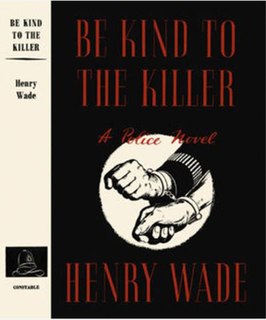
Be Kind to the Killer is a 1952 detective novel by the British writer Henry Wade. As with many of his works it is written in the style of a police procedural.
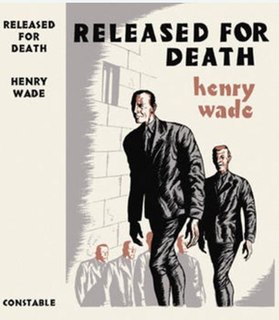
Released for Death is a 1938 crime thriller novel by the British writer Henry Wade. Wade was a writer of the Golden Age of Detective Fiction, best known for his series featuring Inspector Poole. This was one of a number of stand-alone novels he wrote. It has elements of an inverted detective story, rather than the traditional closed circle of suspects.

The Cheyne Mystery is a 1926 mystery thriller novel by Freeman Wills Crofts. It is the second in his series of novels featuring Inspector French, a prominent figure of the Golden Age of Detective Fiction. It followed on from his debut in Inspector French's Greatest Case, in which Crofts introduced a character who was more methodical and less flamboyant than many of the other great detectives who followed in the wake of Sherlock Holmes.
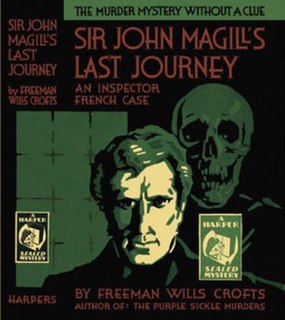
Sir John Magill’s Last Journey is a 1930 detective novel by the Irish writer Freeman Wills Crofts. It is the sixth in his series of novels featuring Inspector French, a prominent figure of the Golden Age of Detective Fiction. Much of the novel takes place in Northern Ireland, particularly around Belfast, where Crofts had spent a great deal of his younger years before moving to England. As with many of his puzzle mysteries its solution revolves around railway timetables as well as the possible distance a boat could cover in a certain time.

Death of an Author is a 1947 detective novel by John Rhode, the pen name of the British writer Cecil Street. It is the forty fifth in his long-running series of novels featuring Lancelot Priestley, a Golden Age armchair detective. The New Yorker described it as "Rather pleasant, in a ponderous fashion" while Will Cuppy, writing in the New York Herald Tribune, felt "Mr. Rhode provides one of those satisfying British stories in the old tradition, full of mystery meat and brain-work."
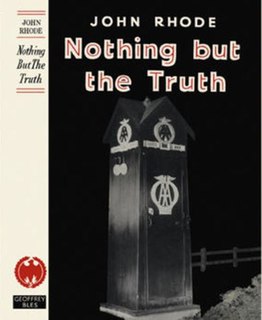
Nothing But the Truth is a 1947 detective novel by John Rhode, the pen name of the British writer Cecil Street. It is the forty forth in his long-running series of novels featuring Lancelot Priestley, a Golden Age armchair detective.

Death in Harley Street is a 1946 detective novel by John Rhode, the pen name of the British writer Cecil Street. It is the forty third in his long-running series of novels featuring Lancelot Priestley, a Golden Age armchair detective. Several sources consider it to be the author's masterpiece.

Death Invades the Meeting is a 1944 detective novel by John Rhode, the pen name of the British writer Cecil Street. It is the thirty ninth in his long-running series of novels featuring Lancelot Priestley, a Golden Age armchair detective. Reviewing the novel for the Times Literary Supplement Maurice Willson Disher noted "His ingenuity is becoming as delicate to handle as high explosive. His stories may become so difficult to review without saying too much that his triumph will come when they cannot, for discretion’s sake, be reviewed at all."

Bricklayer's Arms is a 1945 detective novel by John Rhode, the pen name of the British writer Cecil Street. It is the forty first in his long-running series of novels featuring Lancelot Priestley, a Golden Age armchair detective. It was published in America by Dodd Mead under the alternative title Shadow of a Crime. It was particularly notable for the lesser role played by Priestley, with the case being solved largely by Inspector Waghorn of Scotland Yard alone.



















